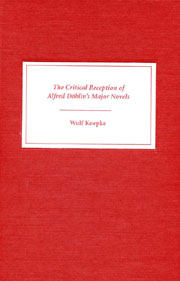1 - Contemporary Reviews before 1933
from Part One - Contemporary Reviews
Published online by Cambridge University Press: 05 February 2013
Summary
Döblin's Concept of the Novel in Crisis, and the Move to the “Epic”
AN ROMANAUTOREN UND IHRE KRITIKER,” Döblin's commentary on the genre of the novel, written in 1913 after the completion of Wang-lun, was a polemic against what Döblin considered the then dominant type of the novel, the psychological novel. With the negation of psychology as the central concern, Döblin turned against the predominance of subjectivity and the focus on the fate of individuals. This implied, for him, a break with the form of the novel as it was then understood. Döblin was never comfortable with the word Roman and the idea of fiction, as he valued scientific observation and reality. Schöne Literatur, fiction in particular, was morally suspect. This view had been reinforced by Döblin's materialistic family environment, above all his mother, so that as a youth Döblin had felt ashamed to admit that he was writing fiction, and had hid the fact from his family.
Döblin's new concept was the “epic,” with the narrator as a selfeliminating medium. Döblin had already experienced what would later be termed the crisis of the novel, and the impossibility of writing novels in the traditional vein had been exemplified by the major anti-novels of the twenties, such as Joyce's Ulysses, Gide's Faux Monnayeurs, and Thomas Mann's Zauberberg, to which we should add Döblin's Wallenstein and Berlin Alexanderplatz. Whereas the new epic would be exemplified by Wallenstein, its concept was clearly present in Döblin's first published novel, Die drei Sprünge des Wang-lun.
- Type
- Chapter
- Information
- Publisher: Boydell & BrewerPrint publication year: 2003



